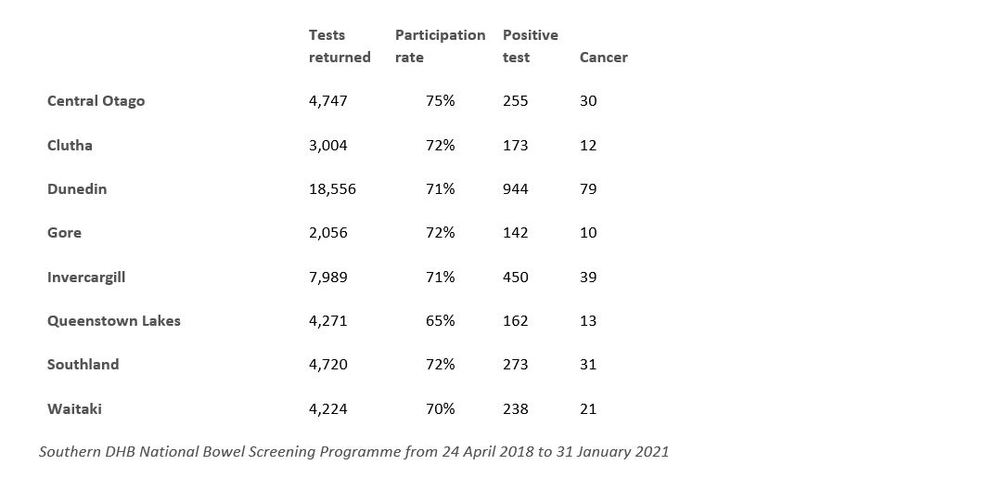Hundreds of cancers detected and prevented
Paul Taylor
29 April 2021, 1:04 AM

Three years in, Southern District Health Board's national bowel cancer screening programme has processed around 50,000 tests, detecting 235 cases.
The health board provides free screening every two years for people aged between 60 and 74 and who are eligible for publicly-funded health care.
Ministry of Health figures to the end of January 2021 show there were 2,637 positive tests returned.
But fewer than one in 10 were diagnosed as cancer.
The screening test can detect tiny traces of blood present in poo, but that can be also be caused by polyps (growths), or other minor conditions such as haemorrhoids (piles), which can easily be treated.
The programme has led to more than 1800 people having polyps removed, which can develop into cancer over time.
About 1200 people die from bowel cancer in New Zealand each year, one of the highest rates in the world, but if caught early tumours can be removed and patients treated effectively.
Dr Jason Hill, the programme's clinical lead, says: "We know sometimes people put off doing the test because they are scared of getting a positive result, but early diagnosis increases the chances of having straightforward and successful treatment".
Regionally, all territorial authority areas are participating at rates between 70% and 75%, with the exception of Queenstown Lakes at 65% – however, this rate continues to exceed the national target. Central Otago has the highest participation rate in the district at 75%.

• Overall participation sits at 72%, above the national target of 60%
• Māori participation is particularly encouraging at 76%
• The rate for Pasifika residents is 68%
• Rural and non-rural residents are participating at equal levels – both 72%
• More women are participating than men, at 74% and 70% respectively.
The SDHB has in recent years come under fire for huge delays for patients waiting for MRI scans, CT scans and colonoscopies, the medical examination procedure conducted once a positive test is returned.
Dr Andrew Connolly was appointed as a crown monitor and chairs the Endoscopy Oversight Group, tasked with improving the situation for colonoscopies at Southland and Dunedin Hospitals, and the waiting lists have reduced significantly in recent months.
Still, while the SDHB and NBSP programme helps those in the age bracket and available for publicly-funded health care, there are many others who contract bowel cancer and struggle to get diagnosed and treated.
Late Southland cancer campaigner Blair Vining was one such case. When diagnosed, he was told he would have to wait eight weeks for an urgent appointment with an oncologist.
He died aged 39, after spending the last months of his life campaigning for better cancer care and a more equitable system nationally.
Work is underway on his Southland Charity Hospital project in Invercargill, and last week Health Minister Andrew Little announced the country's 20 DHBs will be culled and replaced with a national health body, from July next year.